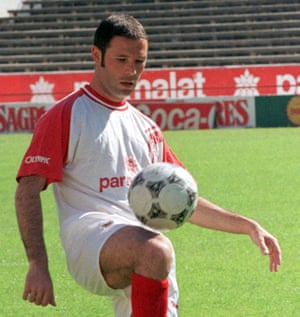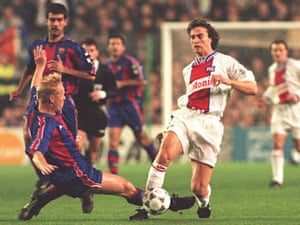David Ginola knew what to expect when he met Jean-Marc Bosman for the first time, but the reality was no less confronting for that. “I should have been meeting a very wealthy man,” he says. “But in fact he’s got nothing at all.”
Football transformed itself in the wake of the Bosman ruling, 25 years ago this week, which allowed players to move freely within the European Union when their contracts ended. But, while footballers and their agents gained unprecedented power and wealth, the man whose legal cases made it possible was left with next to nothing. “People had told me he was destroyed and in a bad condition,” Ginola says. “When I arrived in Belgium and discovered everything, the biggest feeling was one of sadness.”
The men were united for a documentary, screened across this month, about the effect Bosman’s victory in the courts had on his own existence. It is not an easy watch: Bosman had no idea, when attempting in 1990 to free himself from RFC Liège and move to Dunkerque, that he would end up going all the way to the European Court of Justice and lose almost everything in the process. His career fizzled out; his marriage broke up; colleagues disowned him; for a time, alcohol consumed him; he was convicted of assaulting a girlfriend and her teenage daughter. Now 56, he comes across as a subdued figure who is attempting to rebuild himself, step by step. Ginola was left with the conviction that football should be helping with that process so much more.
“Football is getting richer year in, year out, and yet you have a guy who has brought about a significant change and is getting nothing,” he says. “It’s such a shame football itself can’t take into consideration that, if a player can play with the best players around or a club has all these opportunities to make signings, it is because of the Bosman ruling.”

Only a handful of players have volunteered funds to help Bosman. Adrien Rabiot was one, his family donating €12,000 last year when he took advantage of his contract’s expiry at Paris Saint-Germain to join Juventus. Bosman has received assistance from Fifpro, the global players’ union, but although that is welcome it barely scratches the surface of the sacrifices he made.
“It’s never too late when it comes to helping someone,” Ginola says. “It’s never too late for clubs and players to realise that, if they won championships and things like that, they couldn’t have reached that level without the Bosman ruling. You can go backwards and think: ‘I earn €1m a month and this man changed my life, it’s my duty to help someone who made me richer.’ It’s an obvious feeling to have but you need to put something in place.
“I think agents should explain to their players exactly what the Bosman ruling is, who Jean-Marc Bosman is and exactly what he changed, so that they understand why they’ve got the chance to move from club to club as easily as they do. Players are so protected that we don’t properly show them what is behind all this.”

Many of Bosman’s contemporaries deserted him. In the documentary Ginola speaks to a teammate at Standard Liège, Benoît Thans, who says he “scares people … players were very afraid of being associated with him”. Thans admits to feeling guilty “in one way” that he has not visited him during the intervening period, despite receiving phone calls from Bosman in an effort to reach out. He expresses regret, rather than surprise, that the world of football would abandon someone who is considered a renegade and suggests Bosman’s entourage did not help matters with elements of their behaviour. Ginola convenes the pair for a coffee, although the film does not show the exact moment of their reunion, and it heightens the sense of exasperation that Bosman’s treatment over the past quarter-century has been so unnecessary.
“He became a pariah,” Ginola says. “The world of football is very strange. If you stay in the middle of the path, that’s fine. If you don’t make big waves, that’s fine. But if you decide to go left or right, or emphasise a particular point, football then says: ‘Whoa, you’re good with your feet but don’t change anything we decision makers do. Play football, shut up and do what we think is good for you.’”
Ginola thinks that, at the time, Bosman had no idea that his actions would have such seismic implications. Bosman had merely wanted to resolve a local dispute with RFC but ended up taking on European institutions in a fight that lasted five years. In the film Ginola speaks with one of the lawyers involved, who admits it was “not [Bosman’s] intention to totally revolutionise the world of football” and, in an awkward exchange, rejects Ginola’s suggestion Bosman was simply a pawn for ambitious representatives. Speaking now, Ginola says he remains convinced that “the man was used” by people who got the bit between their teeth and saw how far the case could go.
Although he could not have known it at the time, Ginola narrowly missed out on being one of the Bosman ruling’s first high-profile beneficiaries. He was unable to join Barcelona from Paris Saint-Germain in the summer of 1995 because the La Liga club had met their quota of foreign players, a barrier that became obsolete post-Bosman. In 2000 he told the Observer he had been “wasting my talent” in the Premier League with Newcastle and Spurs, but he is in less of a mood for regrets now.

“I only realised how close it was when Jean-Marc and I spoke about the dates during the documentary,” he says. “We laughed together and I said: ‘You bastard, why didn’t you do it before?’ It was a joke and, anyway, I don’t like to go back to the past and think about what could have been.”
Nor does Bosman, both admirably and remarkably. He describes himself as “a man without a face” but does not directly answer the question of whether he would go through the same process again, merely pointing out he was “stubborn” back then. His humility is affecting and he shows no bitterness towards the world that left him behind, merely suggesting tweaks to football’s modern-day workings such as salary caps. Ginola, however, is rather less sparing.
“People destroyed him completely,” he says. “Everyone should have applauded and said: ‘Thank you so much, you allowed us to do things we never thought about.’ Instead, all they did was point their fingers at him.”
Watch ‘Bosman – The Player Who Changed Football’, the latest documentary from the BT Sport Films series, on Sunday 20 December at 9.45pm on BT Sport 1
from Football | The Guardian https://ift.tt/3gYTTsN
via IFTTT

No Comment